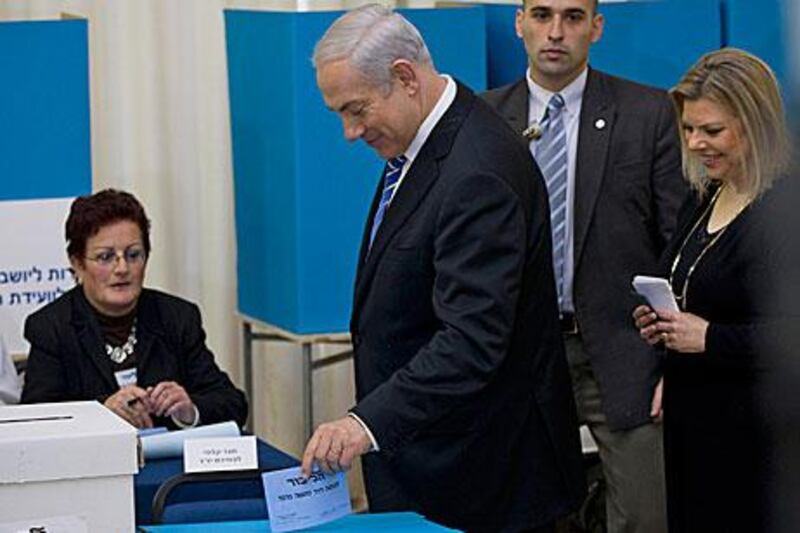JERUSALEM // Prime Minister Benjamin Netanyahu's government made two overtures to West Bank settlers in the run-up to his party's leadership race yesterday: offering financial incentives to encourage people to move to settlements and opening the door to legalising rogue settler outposts.
The gestures appear to be aimed at appeasing hardline elements in the ruling Likud Party who are sympathetic to settlers. While Mr Netanyahu was expected to win the leadership race, a relatively strong showing by his ultranationalist rival would suggest many Likud voters consider the prime minister too soft on peacemaking with the Palestinians.
The moves threatened to derail tentative new peace efforts with the Palestinians. A round of low-level peace negotiations ground to a halt last week, in large part because of Palestinian objections to Israeli settlement construction. The UN chief, Ban Ki-moon, was expected in the region today in an effort to restart the talks.
The Palestinians rejected Mr Netanyahu's latest moves.
"They are adding obstacles at a time when everyone is intensifying efforts to try to resume peace talks," said the Palestinian government spokesman Ghassan Khatib. "I think with every additional settlement activity, the feasibility of having two states is diminished."
Years ago, the Israeli government halted generous financial enticements designed to encourage Israelis to settle in the West Bank, the occupied territory the Palestinians see as the core of their future state.
But in this week's government decision, 70 settlements appeared on a new list of 557 communities inside Israel and the West Bank that qualify for housing subsidies. The incentives, according to the prime minister's office, are "meant to encourage positive migration to these communities".
After suspending benefits unique to the settlements, the government is now encouraging settlers to move to the West Bank under a different programme, said Hagit Ofran, of the anti-settlement group Peace Now.
"They put in 70 settlements, in effect encouraging them to live there," Mr Ofran said.
The list of qualifying settlements include major enclaves that would probably remain in Israeli hands under a peace deal. But most are located deep inside the West Bank and would probably have to be dismantled.
In a separate move, the government on Monday appointed a committee to examine land ownership issues in the West Bank.
The panel will review a 2005 government report that found several dozen outposts were built not only without state approval, but on privately held Palestinian land. Officials said the report needs to be reviewed because its author, the state prosecutor, Talia Sasson, later entered politics with a dovish political party, raising questions about her objectivity.
A court-ordered evacuation of Migron, the largest unauthorised outpost, set for next month would not be affected by the formation of the new committee, officials said.
But the panel's make-up aroused suspicions it would legalise at least some of the more than 100 outposts built without government authorisation, including dozens Sasson says were erected on privately held Palestinian land.
The committee's head, former Supreme Court chief justice Edmond Levy, spoke out against Israel's withdrawal of settlers from the Gaza Strip in 2005. A second panel member, Alan Baker, has represented settlers hoping to legalise unauthorised outposts.
The international community opposes all Jewish settlement activity in the West Bank and east Jerusalem, areas captured by Israel in the 1967 war. But Israel distinguishes between the 121 settlements established in accordance with official procedures and the more than 100 unauthorised "outposts" that skirted the process with the help of sympathetic authorities and are considered illegal.
Peace talks with the Palestinians stalled more than three years ago, largely over continued Israeli settlement construction.





